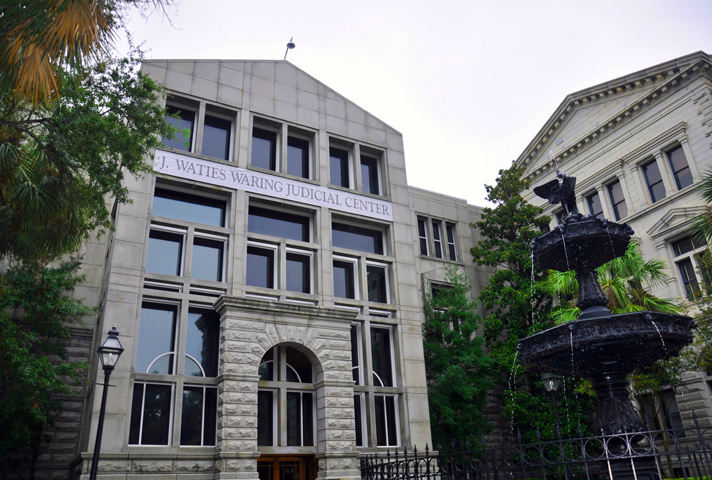Please E-mail suggested additions, comments and/or corrections to Kent@MoreLaw.Com.
Help support the publication of case reports on MoreLaw
Date: 06-21-2017
Case Style:
United States of America v. Michael Kipp and Joanne Viard

Federal Courthouse - Charlotte, North Carolina
Case Number: 3:15-cr-00244-MOC-DSC
Judge: Max O. Cogburn
Court: United States District Court for the Western District of North Carolina (Mecklenburg County)
Plaintiff's Attorney: Maria K. Vento and William Miller
Defendant's Attorney: Bob Blake, Fritz Scanlon, Robert T. Watson and Eric Bruce for Kipp
Mark Timothy Calloway, Julian DuRant, Mike Hoernlein, Emily McGowan, Thomas G. Walker and Brian Boone for Viard
Mark Foster for Swisher Hygiene, Inc. (Movant)
Description: Charlotte, NC - Federal Judge Convicts Two Former Swisher Hygine, Inc. Executives On Securities Fraud Charges Following Bench Trial
Former Senior Level Corporate Employee Previously Pleaded Guilty to Securities Fraud Conspiracy
U.S. District Judge Max O. Cogburn, Jr. delivered guilty verdicts yesterday against two former executives of Swisher Hygiene, Inc. (Swisher), for their respective roles in a securities fraud conspiracy carried out at Swisher throughout fiscal year 2011, announced Jill Westmoreland Rose, U.S. Attorney for the Western District of North Carolina. Michael Kipp, 63, of Charlotte, and Joanne Viard, 38, of Indian Trail, were convicted of conspiring to commit securities fraud, making false and misleading statements to auditors, and falsifying the books and records of Swisher. Defendant Kipp was also convicted of wire fraud, securities fraud, and bank fraud.
Special Agent in Charge John A. Strong, of the FBI’s Charlotte Division joins U.S. Attorney Rose in making today’s announcement.
According to filed court documents, statements made in court, and evidence presented during the three-week bench trial:
Throughout fiscal year 2011, Kipp, who at the time was Swisher’s then chief financial officer, and Viard, a certified public accountant and Swisher’s then director of external reporting, and their conspirators, engaged in an accounting fraud scheme, to ensure that Swisher’s reported earnings had met or exceeded executive management’s forecasts, and to conceal the existence of the fraud from Swisher’s auditors, the investing public and others. In particular, the defendants manipulated Swisher’s books and records, so that Swisher would meet targeted goals despite actual earnings. When falling short of their target, the defendants utilized a number of ways to fraudulently inflate Swisher’s earnings.
The accounting fraud scheme began to unravel when Swisher’s then Controller pushed back on making a fraudulent entry during the year-end close. The Controller wrote in an email, “I’ll run it by BDO [Swisher’s auditors] so we’re on the same page,” to which Defendant Kipp responded, “You’ll run it by me since I’m the chief accounting officer. I’m out of patience with this.” Later, Kipp fired the Controller for his persistent refusal to book the fraudulent entry. Swisher’s Audit Committee learned of the Controller’s allegations and promptly commissioned an independent internal investigation.
Approximately eleven months following the announcement of the federal investigation, Swisher filed restated financial reports for the first three quarters of 2011 and filed its Form 10-K for the 2011 year. The restatement reflected, among other things, that Swisher had substantially overstated its earnings and significantly understated its losses during the relevant time-period.
Previously, Swisher had entered into a Deferred Prosecution Agreement with the United States, in which Swisher accepted and acknowledged responsibility for the conduct of its former employees and agreed to pay a $2 million penalty.
In October 2015, Swisher’s former senior-level accounting employee, John Pierrard, pleaded guilty to securities fraud conspiracy.
The conspiracy charge carries a maximum prison term of five years. The securities fraud and wire fraud charges each carry a maximum prison term of 20 years. The bank fraud charge carries a maximum prison term of 30 years. A sentencing date for the defendants has not been set.
The investigation as led by the FBI. U.S. Attorney Rose also thanked the U.S. Securities & Exchange Commission for their assistance in the case.
Outcome: Guilty
Plaintiff's Experts:
Defendant's Experts:
Comments: